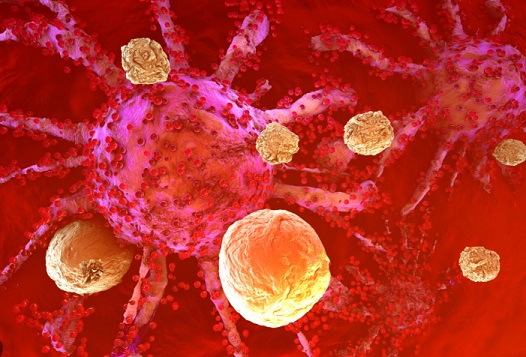Nikhil Prasad Fact checked by:Thailand Medical News Team Feb 09, 2025 2 months, 4 days, 34 minutes ago
Medical News:
A New Study Explores the Possible Link Between a Common Virus and Breast Cancer
A recent study has examined the potential connection between human cytomegalovirus (HCMV) infection and the development of breast cancer. Researchers from the Universidad de Tarapacá in Chile have reviewed clinical and experimental data to assess whether this virus could contribute to breast cancer progression. The findings raise new questions about how viral infections might influence cancer risk.
 Human Cytomegalovirus Infection and Breast Cancer Risk
The Role of Viruses in Cancer Development
Human Cytomegalovirus Infection and Breast Cancer Risk
The Role of Viruses in Cancer Development
It has long been established that certain viruses can lead to cancer. Examples include the human papillomavirus (HPV) in cervical cancer and the Epstein-Barr virus (EBV) in some lymphomas. Now, scientists are investigating whether HCMV, a widespread virus found in many individuals, could be playing a role in breast cancer.
This
Medical News report highlights a growing body of research indicating that HCMV might be present in breast cancer tissues at higher rates than in healthy breast tissue. The virus has been detected in various malignancies, and some researchers believe it may influence tumor development by altering cell functions, increasing inflammation, and disrupting immune responses.
High Prevalence of HCMV in Breast Cancer Tissues
The study reviewed multiple reports showing that HCMV DNA and proteins are frequently detected in breast tumors. Several independent studies have reported that breast cancer samples have a significantly higher rate of HCMV presence compared to benign or healthy breast tissues. For instance, in one analysis, HCMV DNA was found in 56.7% of breast cancer cases, compared to only 24% in benign tumors and none in healthy breast tissue.
Furthermore, some studies suggest that certain HCMV proteins, such as immediate early (IE) antigens and late antigens (LA), may be linked to more aggressive tumor behavior. Researchers have also observed that patients with higher levels of HCMV markers in their tumors tend to have worse overall survival rates.
How Could HCMV Contribute to Breast Cancer
The mechanisms through which HCMV could influence breast cancer development are still being investigated. Some theories suggest that the virus might drive cancer progression by:
-Altering cell signaling pathways: HCMV has been shown to activate genes related to uncontrolled cell growth, which is a hallmark of cancer.
-Suppressing immune responses: The virus can weaken the immune system's ability to detect and destroy abnormal cells, potentially allowing cancer cells to grow unchecked.
-Promoting inflammation: Chronic inflammation is known to be a risk factor for cancer, and HCMV may contribute by triggering inflammatory responses in breast tissue.
-Interferi
ng with tumor suppressor proteins: Some studies indicate that HCMV may interfere with proteins like p53, which normally help to prevent cancer by stopping damaged cells from multiplying.
Debate and Need for Further Research
Despite these intriguing findings, the role of HCMV in breast cancer remains a subject of debate. Some studies have found little or no evidence of the virus in breast tumors, while others report significant associations. Differences in research methods, geographic variations, and individual patient factors may explain these discrepancies.
To resolve this uncertainty, experts call for standardized testing methods and larger, multicenter studies to determine whether HCMV plays a direct role in breast cancer development or whether its presence is simply coincidental.
Potential Implications for Cancer Prevention and Treatment
If further research confirms a link between HCMV and breast cancer, it could have significant implications for cancer prevention and treatment. Strategies might include:
-Developing antiviral therapies: If HCMV contributes to tumor growth, antiviral drugs could potentially slow cancer progression in infected patients.
-Screening for HCMV in high-risk patients: Identifying individuals with HCMV-positive tumors could help doctors tailor treatments more effectively.
-Exploring vaccines: Just as HPV vaccines have successfully reduced cervical cancer rates, an HCMV vaccine could potentially reduce the risk of virus-associated cancers.
Conclusion
While the idea that a common virus like HCMV could contribute to breast cancer is still under investigation, the current evidence suggests a possible association. HCMV DNA and proteins have been detected in breast cancer tissues, and the virus may influence tumor progression through various mechanisms. However, further studies are needed to confirm these findings and determine their clinical significance. If the link is established, new strategies for breast cancer prevention and treatment could emerge, offering hope for improved patient outcomes.
The study findings were published in the peer-reviewed journal: Biology.
https://www.mdpi.com/2079-7737/14/2/174
For the latest on Breast Cancer, keep on logging to Thailand
Medical News.
Read Also:
https://www.thailandmedical.news/news/molecular-profiling-and-reducing-toxic-therapy-in-breast-cancer
https://www.thailandmedical.news/news/monensin-shows-potential-to-inhibit-triple-negative-breast-cancer-growth
https://www.thailandmedical.news/news/ubr2-in-triple-negative-breast-cancer-offers-new-hope-for-immunotherapy
https://www.thailandmedical.news/articles/cancer
